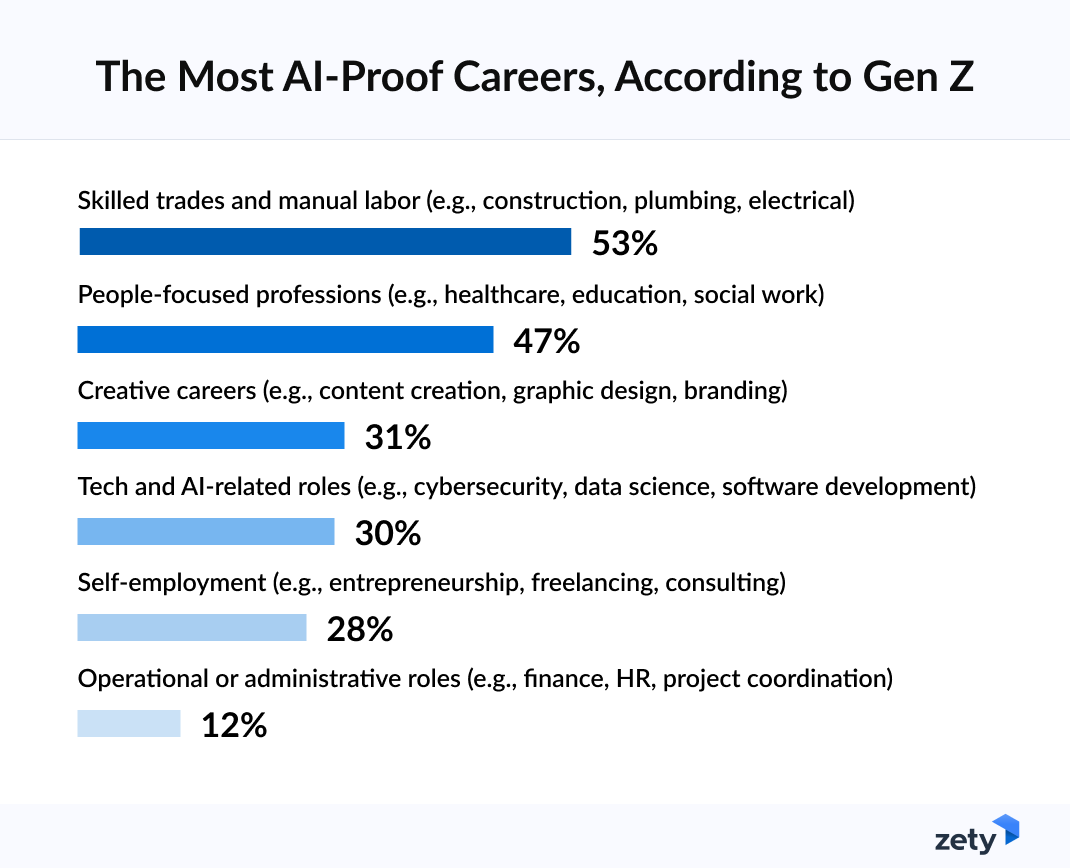
Gen Z jobs are evolving fast as this generation enters the workforce during a time of profound disruption and uncertainty. With AI advancing rapidly and college degrees losing their perceived value, young professionals are reevaluating what a “safe” career looks like. As traditional pipelines feel less secure, many are actively rerouting their careers by switching industries, upskilling, and turning to trade work, thus solidifying their role as the Reroute Generation.
Zety’s Gen Z Reroute Report, based on a national survey of 1,000 Gen Z workers, uncovers how this generation is navigating AI anxiety, redefining job security, and reshaping the future of work. Jasmine Escalera, Zety career expert, coins this shift the AIxiety Pivot—a growing movement of young professionals proactively changing course in response to AI’s rapid rise and the instability it brings to traditional career paths.
Key findings:
- Degrees don’t feel like a safety net anymore: Nearly two-thirds (65%) of Gen Z say a college degree won’t protect them from AI-related job loss.
- Confidence in career longevity is slipping: Nearly 1 in 5 (18%) have little to no faith that their current career path will remain relevant over the next 10 years.
- AI is actively reshaping Gen Z’s career decisions: 43% have already changed or adjusted their career plans because of AI’s growing influence.
- Trade work is becoming a serious option: More than half of Gen Z workers (53%) say they’re now seriously considering blue-collar or skilled trade work.
- Cultural influences are fueling the shift: Social media (53%) and family encouragement (47%) are the top drivers shaping Gen Z’s perception of blue-collar work.
Early Career Anxiety in the Age of AI
Concerns about long-term stability are widespread as AI reshapes the job market:
- 72% believe AI will reduce entry-level corporate job opportunities in the next five years, and 17% believe these roles will be eliminated outright.
- 65% don’t believe a college degree offers protection from AI-driven job loss.
- Nearly 1 in 5 (18%) have little to no confidence that their current career path will be relevant in the next 10 years.
What this means: Gen Z isn’t just aware of AI’s impact; they’re internalizing it. For many, long-term career planning now feels like a gamble, not a guarantee.
How Gen Z Is Responding to AI Disruption
As AI accelerates, many Gen Zers are taking action:
- 40% are teaching themselves new skills or earning certifications.
- 29% of Gen Z are switching jobs by looking at entirely new industries.
- 18% are rage-applying to jobs out of frustration.
What this means: Rather than waiting for the job market to shift beneath them, many Gen Zers are taking preemptive action—upskilling, pivoting industries, and, in some cases, reacting emotionally to rising instability.
What Careers Are Gen Z Most Interested In?
Nearly half (43%) of Gen Z workers have already changed or adjusted their career plans due to AI. When asked which paths feel more secure, their answers reflect a desire for roles grounded in human connection, creativity, and physical skills:
- 53%: Blue-collar and skilled trades (e.g., construction, plumbing, electrical)
- 47%: People-focused professions (e.g., healthcare, education, social work)
- 31%: Creative careers (e.g., content creation, graphic design, branding)
- 30%: Tech and AI-related roles (e.g., cybersecurity, data science, software development)
- 28%: Self-employment (e.g., entrepreneurship, freelancing, consulting)
- 12%: Operational or administrative roles (e.g., finance, HR, project coordination)

What this means: Gen Z is gravitating toward careers that require a human touch or physical skill, areas where they believe algorithms can’t fully compete.
What’s Driving Gen Z Toward Blue-Collar Jobs?
More than half of Gen Z workers (53%) say they’re now seriously considering blue-collar or skilled trade work. AI is a major factor, but it’s not the only one:
- Higher pay than expected in current roles (50%)
- More job opportunities (44%)
- Greater flexibility and independence (35%)
- Faster entry into the workforce without a degree (19%)
- Avoiding student loan debt (18%)
What this means: The move toward Gen Z trade jobs is both defensive and strategic. Gen Z sees hands-on careers as offering faster returns, better pay, and greater autonomy than many white-collar roles.
Barriers to Entering Blue-Collar Careers Still Remain
Even with growing interest, not all Gen Zers are ready to embrace skilled trades, and several barriers are slowing the shift:
- 38% cite physical labor demands as their biggest hesitation.
- 19% worry about limited upward mobility in these roles.
- 16% admit they don’t know enough about trade careers to pursue one.
- 14% feel there’s a lack of prestige in blue-collar work.
Various cultural and social influences are shaping their perceptions:
- 53% say social media influencers (e.g., Trades TikTok) have influenced their views.
- 47% cite family background or encouragement.
- 27% feel disillusioned with corporate culture.
- 21% cite a lack of diversity in white-collar fields as a factor.
What this means: Even with growing interest, outdated perceptions and a lack of access to information are holding some young Gen Z workers back from fully embracing blue-collar jobs.
While Gen Z is increasingly open to alternative career paths, many still lack the guidance and resources to make confident leaps. Bridging this gap will require more accessible information, mentorship, and a shift in how society values skilled trades.
For press inquiries, contact Skyler Acevedo, Public Relations Specialist, at skyler.acevedo@bold.com.
Methodology
The findings presented are based on a nationally representative survey conducted by Zety using Pollfish on June 24, 2025. The survey collected responses from 1,000 Gen Z workers in the U.S. and explored their career outlook in the age of artificial intelligence, including their views on job security, the relevance of college degrees, AI’s impact on entry-level roles, and shifting interest toward trade careers. This Gen Z AI research offers fresh insight into what jobs Gen Z want as they adapt to a rapidly evolving job market.
They answered different types of questions, including yes/no, open-ended, scale-based questions where respondents indicated their level of agreement with statements, and multiple-choice where they could select from a list of provided options. The sample was composed of 62% female and 37% male respondents. All participants were screened to ensure they were currently residing in the U.S., actively employed, and part of the Gen Z generation (aged 18-27) at the time of the survey. The data collection adhered to Pollfish’s quality control standards to ensure the accuracy and reliability of the results.
About Zety
Zety resume templates and Zety's resume and cover letter generator are trusted by 12 million users each year. With 100s of options to choose from, including professionally designed resume templates to beat the ATS, users can create a professional resume in less than 15 minutes. Since 2016, Zety’s career blog has provided free data-driven insights to over 40 million readers annually, empowering professionals at every stage. The editorial team includes Certified Professional Resume Writers, with the best career advice and evidence-based findings featured in Business Insider, CNBC, and Forbes, among others. Follow Zety on Facebook, LinkedIn, YouTube, X, and Instagram for free expert career tips and updates.


